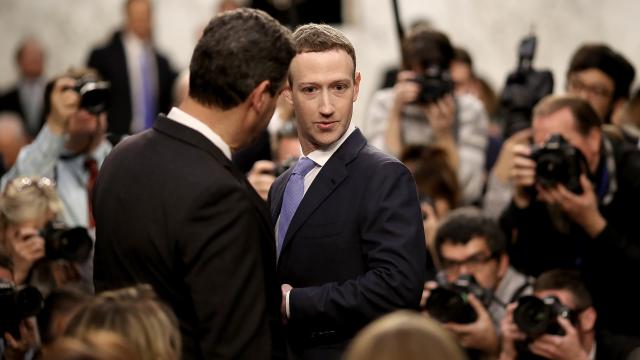A British parliamentary committee concluded its 18-month investigation into social media practices and issued its report on Monday. Facebook received particular focus in the report with lawmakers accusing the company of intentionally breaking the law and claiming that CEO Mark Zuckerberg has failed in his leadership of the social network.
The UK Parliament’s Digital, Culture, Media and Sport Committee was spurred to launch an investigation of social media in 2017 following revelations regarding Russian election-meddling and later, the Cambridge Analytica scandal.
The resulting 108-page report takes Facebook to task on numerous issues including violating its own privacy agreement with users and participating in anti-competitive practices.
“Companies like Facebook should not be allowed to behave like ‘digital gangsters’ in the online world, considering themselves to be ahead of and beyond the law,” the committee wrote.
Electoral security, online harassment, and privacy violations were some of the primary concerns of the committee and it recommended action by a wide range of UK regulators to rein in Facebook’s powers. “Among the countless innocuous postings of celebrations and holiday snaps, some malicious forces use Facebook to threaten and harass others, to publish revenge porn, to disseminate hate speech and propaganda of all kinds, and to influence elections and democratic processes,” the committee claimed. “Much of which Facebook, and other social media companies, are either unable or unwilling to prevent.”
Those types of accusations are nothing new for Facebook, and over the last year, we’ve seen lawmakers in many countries diagnose similar problems with the company. But the DMCS Committee took particular issue with court documents that Parliament uncovered last year.
The documents contained internal emails in which Facebook executives discussed extending access to user data to third-parties that spent big on advertising. The committee saw this as evidence of anti-competitive practices in which Facebook was overriding “its users’ privacy settings in order to transfer data to some app developers; to charge high prices in advertising to some developers, for the exchange of data, and starve some developers—such as Six4Three — of that data, contributing to them losing their business.”
Facebook has denied that characterization. It claimed that it ended a program that allowed users to share their friends’ data with developers in 2015 and only extended the functionality for certain developers on a short-term basis in order to avoid breaking the user experience.
But for UK lawmakers, any sort of misunderstanding of Facebook’s business practices could be chalked up to its executives’ resistance to cooperate in the investigation. Damian Collins, Chair of the DCMS Committee, wrote that Facebook “often deliberately sought to frustrate our work, by giving incomplete, disingenuous and at times misleading answers to our questions.”
Collins also singled out Mark Zuckerberg’s repeated refusal to testify in person before the committee. “Even if Mark Zuckerberg doesn’t believe he is accountable to the UK Parliament, he is to the billions of Facebook users across the world,” Collins wrote.
One of the report’s more interesting details is that it claims the Information Commissioner’s Office (ICO) shared the names of three “senior managers” at Facebook with the committee who allegedly were aware of the Cambridge Analytica data breach prior to the 2015 date that Facebook has claimed it first learned about the incident.
The managers’ names were not revealed in the report but the committee found it unconscionable that the issue wasn’t brought to Zuckerberg’s attention until 2018. “The incident displays the fundamental weakness of Facebook in managing its responsibilities to the people whose data is used for its own commercial interests,” the committee wrote.
When asked for comment on the report, a Facebook spokesperson told Gizmodo:
We are open to meaningful regulation and support the committee’s recommendation for electoral law reform. But we’re not waiting. We have already made substantial changes so that every political ad on Facebook has to be authorised, state who is paying for it and then is stored in a searchable archive for 7 years. No other channel for political advertising is as transparent and offers the tools that we do.
While we still have more to do, we are not the same company we were a year ago. We have tripled the size of the team working to detect and protect users from bad content to 30,000 people and invested heavily in machine learning, artificial intelligence and computer vision technology to help prevent this type of abuse.
In its statement, Facebook rejected “all claims that [it] breached data protection and competition laws”
The report was vague in its recommendations for regulation. It broke down its suggestions into four categories:
-
Compulsory Code of Ethics for tech companies overseen by an independent regulator.
-
Regulator given powers to launch legal action against companies breaching code.
-
Government to reform current electoral communications laws and rules on overseas involvement in UK elections.
-
Social media companies obliged to take down known sources of harmful content, including proven sources of disinformation.
German regulators have cracked down hard on Facebook’s data-collection practices and the U.S. government is reportedly weighing a multi-billion dollar fine for the social network violating its 2011 consent agreement with the FTC.
That’s in addition to the numerous state Attorneys General who are conducting their own investigations into the company data practices. But none of that seems to be having much of an impact on Facebook’s earnings, it reported record profits last quarter. Lawmakers can issue strongly-worded reports all they want but until shareholders start complaining, we can expect Facebook to continue paying lip-service to its core problems.
